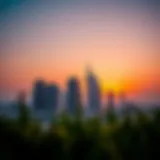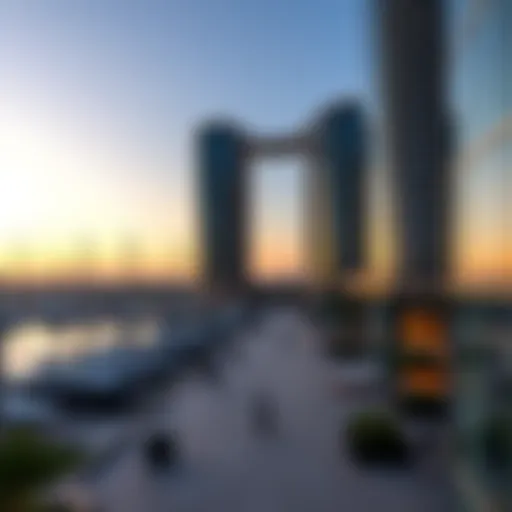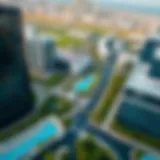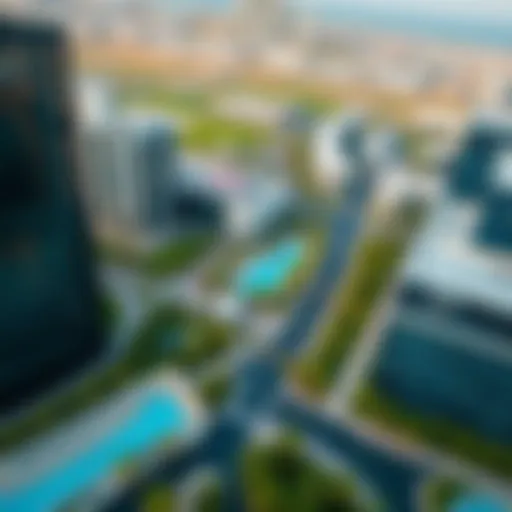Eid ul Fitr 2023 Prayer Times in Dubai
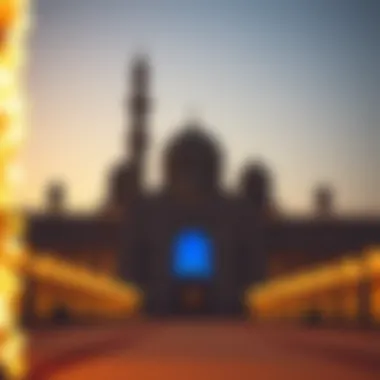

Intro
Eid ul Fitr marks the end of Ramadan, a month of fasting and reflection for Muslims. In Dubai, the city transforms into a vibrant tapestry of festivities, traditions, and communal prayers. Understanding the intricacies of the prayer times and local customs beside them allows both residents and tourists to completely appreciate the essence of this significant occasion.
The observance of Eid ul Fitr is a testament to the rich cultural fabric of Dubai. The prayer itself is a moment when the community gathers, dressed in their finest, to express gratitude for the blessings received through Ramadan. This year, as 2023 unfolds, knowing the exact prayer times is essential for anyone wishing to participate in the celebrations.
Navigating through this guide, readers will find essential information on prayer timings, the venues where the prayers will take place, and the specific traditions that help make Eid a truly unforgettable experience in the heart of Dubai.
While the essence of the holiday remains unchanged, the practices and timings may evolve slightly from year to year, reflecting the lunar calendar. Accuracy is particularly vital, as local mosques and communities will begin their prayers promptly at the announced time, marking the occasion with unity and devotion.
Moreover, the festive atmosphere extends beyond prayers. Markets and malls will be bustling with people, seasonal delicacies will fill the air, and special events will dot the cityscape. Understanding the timings allows for better planning, ensuring that no one misses the prayers, nor the surrounding celebrations.
Essentially, this guide serves as a treasure map, not just to the prayer times but also to the cultural significance and events surrounding Eid ul Fitr in Dubai. The following sections will delve into the specifics of the prayer timing, offering a valuable tool for those preparing to engage in this holiday.
Prolusion to Eid ul Fitr
Eid ul Fitr marks the conclusion of Ramadan, a holy month devoted to fasting and prayer. Not merely a festive occasion, it resonates deeply with historical and cultural significance, especially in regions such as Dubai, where diverse traditions come together. Understanding Eid ul Fitr offers insights into the values and beliefs that shape the local community.
The importance of this celebration cannot be overstated; it serves as a cornerstone of faith and community bonding, bringing people together in joyous reverence. The observance begins with communal prayers, a symbol of unity among Muslims, demonstrating collective gratitude for life's blessings. Moreover, Eid ul Fitr encourages acts of charity, reinforcing the communal spirit essential to the Muslim faith.
With this guide, readers will uncover the layers of significance enveloping Eid ul Fitr in Dubai. From the historical roots that date back centuries to contemporary practices, each element warrants attention. This exploration highlights how the festival is more than a personal celebration—it’s an event that knits the fabric of Dubai's multicultural landscape tighter, promoting inclusivity and understanding.
Historical Significance
Eid ul Fitr's historical background is rich with meaning, transcending mere celebration. It embodies the teachings of the Quran, symbolizing forgiveness, self-reflection, and the importance of community. This festival traces back to the time of Prophet Muhammad, who established the practice as a way to foster unity among the growing Muslim community after months of fasting.
Delving deeper, one can observe how Eid ul Fitr was initially a means to celebrate the end of hardships endured during Ramadan. As fasting cultivates self-discipline and devotion, the festival symbolizes reward—an affirmation of faith renewed among practitioners. Not only does this historical perspective enrich the Muslim celebration, but it also provides a platform for interfaith dialogue, particularly in a diverse city like Dubai, where various cultures intertwine.
Cultural Relevance in Dubai
In Dubai, Eid ul Fitr extends beyond a religious observance. It has evolved into a cultural phenomenon that reflects the ethos of the emirate’s society. With its exhilarating mix of tradition and modernity, the festival exemplifies how historical customs can flourish in pursuit of progress.
Local customs, such as communal feasts and adorned homes, add vibrancy to the occasion. Families prepare specific dishes that have been passed down through generations, fostering a sense of belonging and identity. In public spaces, decorative lights and music create an ambiance that signifies celebration and joy, while soaring skyscrapers serve as canvases for colorful displays in honor of Eid.
On a more profound level, Eid ul Fitr in Dubai serves as a reminder of philanthropy and generosity. The act of Zakat—charitable giving—takes center stage, encouraging individuals to contribute to those in need. This ethos aligns well with Dubai's aspiration to be a hub of compassion, combining heritage with progress, thereby establishing a cultural framework that resonates with both locals and expatriates.
With this groundwork laid, will now delve into the practical arrangements surrounding Eid ul Fitr, particularly how to determine the timing for prayers and celebrations.
Understanding the Timing of Eid ul Fitr
Understanding the timing of Eid ul Fitr is crucial for anyone wishing to participate fully in this significant occasion. The alignment of prayer times with the lunar calendar plays a fundamental role in determining the date of Eid ul Fitr each year. With a focus on the precise timing of prayers, worshippers can ensure they are engaged in communal worship at the right moment. Additionally, this understanding enhance's the connection to the spiritual significance of the occasion, fostering unity among the participants.
Lunar Calendar and Eid
The Islamic calendar is distinctly lunar, meaning that the months are based on the moon's cycles rather than the solar calendar that most of the world follows. Eid ul Fitr is observed on the first day of Shawwal, the month that follows Ramadan. The exact date cannot be set in stone until the sighting of the new moon, making each year's celebration unique based on lunar observations.
This moon sighting practice is usually performed by local Islamic authorities to confirm the end of Ramadan and the beginning of Eid. It can lead to slight variations in the Eid date among different countries or even regions within the same country, such as Dubai. For instance, while the moon may be sighted on a specific day in Saudi Arabia, it could be seen a day later in certain areas of the UAE, influencing when Eid ul Fitr is celebrated.
Here's how lunar months affect Eid:
- Visibility Challenges: Weather and atmospheric conditions can impact the moon sighting, adding an element of uncertainty.
- Cultural Practices: Various communities may have their own traditions or interpretations on moon sightings, which can lead to differences in the holiday’s observance.
- Variations in Date: One year, Eid might fall on a Saturday while the next it's on a Sunday, which can affect planning for events and prayers.
Prayer Timing Calculation
The calculation of prayer times on Eid is determined by various factors, primarily influenced by geographical location. In Dubai, the prayer time for Eid ul Fitr is typically set to align with the sunrise, which adds another layer of complexity to the timing. The prayer takes place shortly after the dawn prayer, following the sighting of the moon that marks the end of Ramadan.
Usually, the prayer times are announced officially by mosques and Islamic centers around Dubai. As a general guidance, here’s what one might expect:
- Fajr: The dawn prayer, completing before the sun rises.
- Eid Prayer: Scheduled soon after Fajr and before noon, ensuring participants can enjoy the ceremony in daylight.
To assist worshippers in planning, local online platforms might provide detailed timings published for each community, often taking into account exact longitude and latitude.
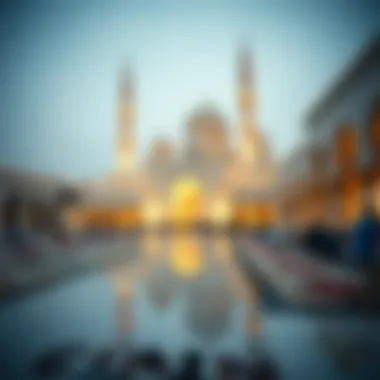

In summary, understanding the timing of Eid ul Fitr involves both the lunar calendar's implications and the local practices surrounding prayer. By being aware of these elements, individuals can better prepare for this holy celebration while embracing its spiritual essence.
Prayer Time for Eid ul Fitr in Dubai
Eid ul Fitr marks the end of Ramadan, a sacred month of fasting and reflection. In Dubai, the timing of this occasion carries deep significance, not just as a religious observance but also as a moment that unites communities. Knowing the correct prayer times is vital for Muslims, as these moments symbolize gratitude to Allah for the strength to complete the fast.
The prayer times for Eid ul Fitr vary, influenced by the lunar calendar. For the 2023 observance in Dubai, specific prayer timings will directly reflect moon sighting activities, emphasizing the astronomical aspect of this sacred day. For the community in Dubai, these prayers offer more than spiritual fulfillment; they represent togetherness, a shared devotion among families, friends, and neighbors.
Understanding the importance of precise prayer hours becomes essential for arranging family gatherings and participating in community practices. Those who miss the prayers may miss out on a quintessential element of Eid celebrations.
Official Announcements
The announcement of prayer times usually comes from the Islamic Affairs and Charitable Activities Department of Dubai. They track lunar observations and provide official timings, usually announcing them a day or two before Eid. This year, it is likely to be publicized through various channels, including community centres, mosques, and social media platforms.
- Eid Prayers scheduled traditionally occur in the early morning, typically after sunrise. In Dubai for 2023, timings are about 5:30 AM to 6:00 AM, but these can change slightly based on specific moonsightings.
Staying updated through official resources can help prevent any mix-ups, allowing families to gather in time for prayers. Make sure to check government announcements or reliable local news for the finalized times the day before Eid.
Community Observance
The spirit of Eid ul Fitr is deeply embedded in community observance. In Dubai, families dress in traditional attire, children with excitement, and the air is thick with the scent of festive food. The prayers serve as a unifying force, where the local community gathers to pray together.
Local mosques like Jumeirah Mosque or Sheikh Zayed Road Mosque become hubs of activity on Eid. It's common to witness a diverse demographic in attendance, reflecting the multicultural fabric of the city.
This year, communities may also organize special events post-prayer to celebrate the occasion, creating an atmosphere of joy and generosity. They may set up charity drives right after the prayers, fostering an environment of giving—important in Islamic teachings. The essence of community is palpable as laughter and joy fills the air, but it all begins with precisely observing the prayer times.
In summary, the prayer times for Eid ul Fitr in Dubai not only mark a religious occasion but also serve as a focal point for community bonding and practicing Islamic teachings. Everyone is encouraged to be proactive in understanding and attending these prayer times, strengthening their ties with family and community.
Locations for Eid ul Fitr Prayers in Dubai
Choosing the right location for Eid ul Fitr prayers in Dubai is more than just a logistical decision; it embodies the spirit of togetherness and community that the occasion represents. The city pulsates with energy as residents, regardless of background, flock to designated prayer sites. From ancient mosques steeped in history to sprawling outdoor areas designed to accommodate thousands, each location bears its significance and charm. Knowing where to go not only ensures participation in the rituals of the day but also enriches the experience, allowing for deeper connections with fellow worshippers and the traditions surrounding Eid.
Major Mosques in Dubai
Major mosques in Dubai serve as focal points for prayer during Eid ul Fitr. The Jumeirah Mosque, an architectural gem, opens its doors to a diverse audience, welcoming everyone to celebrate this joyous occasion together. Meanwhile, the Grand Mosque in the historic Dubai Creek area holds a place of reverence, often drawing larger crowds due to its vast capacity and historical significance.
- Jumeirah Mosque: One of the most photographed mosques, known for its beautiful white stone architecture.
- Grand Mosque: Offers ample space and a rich cultural backdrop, making it a gathering place for both locals and visitors alike.
These mosques not only facilitate the prayers but also uphold these age-old traditions, enriching the lives of worshippers spiritually and socially.
Outdoor Prayer Areas
In addition to mosques, Dubai has designated several outdoor prayer areas to accommodate the growing number of participants during Eid. The Dubai World Trade Centre serves as one of the main hubs, providing a vast outdoor space that can host thousands.
Outdoor areas often foster a unique ambiance, filled with festive decorations and the vibrant sounds of celebration. They ensure that everyone has a place to pray, reflecting the communal nature of the holiday. Popular outdoor locations include:
- Dubai World Trade Centre
- Al Safa Park
- Zabeel Park
These spaces not only allow for ample room but also facilitate a sense of unity among diverse groups, further enhancing the communal experience.
Accessibility Considerations
Accessibility plays a crucial role in ensuring everyone can partake in the celebrations. Organizers are mindful of accommodating individuals with disabilities. Many of the major mosques and outdoor prayer areas are equipped with ramps and other facilities to provide smooth access for all attendees.
- Parking: Adequate parking is often available, but it can fill up quickly, so it is advisable to arrive early.
- Transportation: Public transport options such as the Metro and buses are enhanced during Eid, with increased frequencies and extended hours to handle the larger crowds.
- Restroom Facilities: Many locations ensure that restroom facilities are plentiful, including accessible options.
By selecting prayer venues that are accessible and well-serviced, attendees can focus on the spiritual significance of the day without the added stress of logistical hurdles.
"The essence of Eid ul Fitr lies not only in prayer but also in sharing joy and blessings with fellow community members. Choosing the right location is a step toward realizing this spirit fully."
Gathering in these locations not only strengthens faith but also reinforces community bonds, creating memories that last far beyond the day itself.
Traditional Practices during Eid ul Fitr
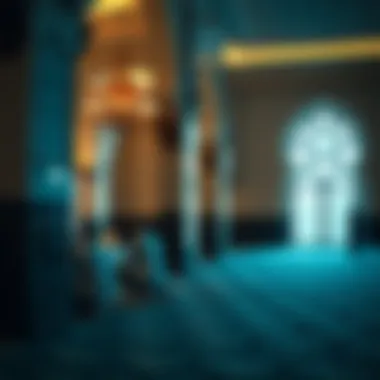

The significance of traditional practices during Eid ul Fitr extends far beyond mere customs. They embody the very essence of community, spirituality, and family ties, particularly in a culturally rich setting like Dubai. This period is marked by a sense of unity and shared purpose, where each practice serves as a reminder of the values and teachings of Islam as well as the broader human connection that transcends individual differences.
Acts of Charity
One of the cornerstones of Eid ul Fitr is the act of charity, known as Zakat al-Fitr. This charitable obligation is required from every Muslim, where it is imperative to help those who are less fortunate. It’s typically given before the Eid prayer, ensuring that everyone can partake in the festivities.
Being rooted in the principles of empathy and altruism, this practice significantly strengthens the community fabric in Dubai. It's not just about fulfilling a religious requirement; it’s also an opportunity to engage with local charities or families in need, helping to foster a spirit of generosity.
- Local implications: Charitable organizations like the Islamic Affairs and Charitable Activities Department in Dubai play pivotal roles, guiding donations and ensuring that assistance reaches those who require it the most.
- Broader outreach: Many individuals also choose to contribute to charitable causes that extend outside their immediate communities, amplifying the impact of their generosity.
In practice, acts of charity during Eid ul Fitr not only reflect personal growth and faith but also influence the socio-economic landscape by promoting welfare and support among communities.
Family Gatherings and Festivities
Family gatherings are another vital aspect of Eid ul Fitr. As the holy month of Ramadan concludes, families in Dubai come together, reinforcing bonds that might have been stretched thin over busy schedules. These gatherings serve as a platform for shared joy, reflection, and the exchange of traditions stemming from previous generations.
The festivities typically include:
- Special Meals: Food plays a central role, with many families preparing traditional dishes such as Biryani, Kebabs, or sweets like Baklava and Knafeh. Sharing meals brings everyone together, promoting a sense of belonging and gratitude.
- Gifts and Eidi: The custom of giving gifts, often in the form of money or new clothes for children, adds layers of excitement. This is known as Eidi, which symbolizes love and affection among family members.
- Cultural Performances: Dubai’s vibrant culture is also showcased through various events organized during Eid. From music performances to art exhibitions, these activities highlight the multicultural dimensions of the Emirate, fostering an atmosphere of inclusiveness.
Celebrations during Eid ul Fitr in Dubai are recognition of not just personal faith but also a collective appreciation for community values, unity, and belonging. It is these traditional practices that bind individuals to their heritage while simultaneously opening the door for new experiences and relationships within a rapidly evolving society.
In summary, both acts of charity and family gatherings serve as essential elements of Eid ul Fitr that advance social responsibility and enhance communal ties, making this occasion all the more meaningful for residents of Dubai.
Understanding the Community Atmosphere
Eid ul Fitr in Dubai is more than just a day marked on the calendar; it’s a testament to the city’s vibrant community spirit. The atmosphere during the celebrations reveals a rich tapestry of social connections, traditions, and deep-rooted values that emerge prominently during this festive occasion. In understanding this community atmosphere, one can recognize not only the importance of shared faith and celebration but also the underlying relationships that are cultivated in these moments. The benefits of fostering such an atmosphere cannot be overstated, as it nurtures collective identities, strengthens bonds, and brings about a sense of belonging.
Community Bonding
Community bonding during Eid goes beyond mere social interactions. It’s about individuals coming together, crossing lines that often divide us. In Dubai, where many cultures and nationalities coexist, the spirit of Eid ul Fitr acts as a powerful unifier. Families gather, often welcoming friends and neighbors to celebrate the end of Ramadan together.
Activities like sharing traditional sweets, participating in communal prayers, and engaging in festive meals are not just ritualistic but serve to deepen connections.
- Family gatherings foster deeper relationships, enhancing ties both within immediate households and among extended families.
- Outsiders are warmly invited to partake in the festivities, showcasing a culture of hospitality and openness.
- Community centers often host events that introduce various cultural practices and customs, creating an environment of mutual respect and understanding.
Moreover, the various activities organized enrich the community. Charity events during Eid, which many participate in, emphasize the spirit of giving, encouraging those who are better off to support the less fortunate. This not only reinforces community ties but also promotes an ethos of caring and cooperation.
Interfaith Relations
The community atmosphere on Eid ul Fitr also underscores the importance of interfaith relations within a multicultural society like Dubai. The essence of this festival—gratitude, compassion, and unity—extends beyond the Muslim community, opening avenues for dialogue and respect with other faiths.
During these celebrations, people from different backgrounds often join in, whether by attending prayers, participating in local events, or simply exchanging greetings. This intermingling fosters a greater understanding of Islamic practices and the significance of Eid.
- Many places hold open houses, inviting individuals from various faiths to experience the celebrations, thus breaking down barriers.
- Educational programs and workshops about Eid and its traditions are established, allowing non-Muslims to learn about the cultural significance of the holiday.
- Interfaith dialogues often emerge during this time, where people of different religions can share their experiences and discuss common values.
These interactions highlight that Eid ul Fitr, while deeply rooted in Islamic tradition, transcends to become a common thread that weaves together the diverse tapestry of Dubai’s community. The celebratory spirit nurtures coexistence, understanding, and mutual respect that are vital to the city’s harmonious existence. As the saying goes, "A house divided against itself cannot stand," and during Eid, the strong sense of unity stands as a testament to the resilient social fabric in Dubai.
Preparing for Eid ul Fitr
Preparing for Eid ul Fitr is not merely about planning events; it encompasses a deeper significance steeped in tradition, reflection, and community. This time of year calls for individuals and families to engage in both spiritual and practical preparations to cultivate an atmosphere of festivity and gratitude. Understanding the nuances of these preparations can enhance one’s experience during the occasion.
Spiritual Preparation
One of the most profound aspects of preparing for Eid ul Fitr is the spiritual readiness it necessitates. This occasion serves as a moment of reflection and growth following the month of Ramadan, a period of fasting and prayer. It's essential to invest time in personal reflection, focusing on one's relationship with God and the lessons learned during fasting.
Many people choose to engage in additional prayers and reading of the Quran in the days leading up to Eid. In fact, it’s not uncommon for congregational prayers to be arranged, fostering a sense of community and shared intention. The act of giving Zakat al-Fitr, which is a charitable donation made to the needy before the Eid prayer, is also crucial in ensuring that everyone can participate in the celebrations. Prioritizing these spiritual aspects of Eid prepares the heart and mind, paving the way for a deeper celebration.
Practical Arrangements
While the spiritual components are vital, the practical side of preparations should not be overlooked. This encompasses various considerations, from planning communal meals to selecting the attire for the day. Many families pick out new clothes, adhering to a tradition that symbolizes renewal and joy. It is typical to see individuals donning bright garments to match the festive atmosphere.
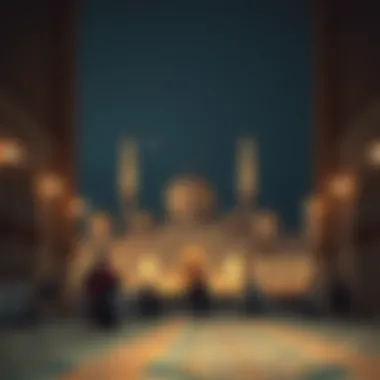

- Make a checklist: Preparing a checklist can help ensure that nothing is forgotten. Key items include:
- New clothes and shoes
- Ingredients for traditional meals
- Gifts for family and friends
- Travel arrangements if necessary
In addition to this, setting up decorative elements at home contributes to the festive spirit. Lights, banners, and other decor can transform a space, making it welcoming for guests. In Dubai, many people also take part in organized community events, where local cultures blend together beautifully. Therefore, keeping an eye on community announcements and preparing to engage in these events can maximize the Eid ul Fitr experience.
Eid ul Fitr is not only a celebration but also an opportunity to reaffirm bonds, share joy, and foster unity within the community.
Fitting all these pieces together requires forethought but yields rewards that extend beyond the day itself. By approaching preparatory tasks with intention, the anticipation of Eid can become a fulfillment of deeper values reflected in one's actions.
Impact of Eid ul Fitr on the Dubai Economy
Eid ul Fitr, celebrated at the conclusion of Ramadan, carries significant economic weight in Dubai—a city known for its vibrant trade and tourism. The observance of Eid influences various sectors, contributing to both direct and indirect economic benefits. Understanding these impacts can guide investors and local businesses toward effective strategies to capitalize on the festive season.
Retail Sector Response
The retail sector in Dubai experiences a substantial spike during Eid ul Fitr. Retailers often roll out attractive promotions, sales, and special collections tailored for the festivities. It's not uncommon to see discounts ranging from 20% to 50% across major shopping malls like The Dubai Mall and Mall of the Emirates.
- Consumer behavior changes: Shoppers flock to malls seeking gifts and outfits, which leads to increased foot traffic. The cultural expectation of buying new clothes and presents reinforces this surge.
- Extended shopping hours: Many stores extend their operational hours leading up to and during Eid, accommodating the influx of customers eager to make last-minute purchases.
- Online sales growth: The rise of e-commerce in recent years has added an online dimension to shopping. Websites like Noon and Amazon.ae have detailed sections dedicated to Eid, catering to those who prefer the convenience of digital shopping.
- Job creation: Temporary employment increases as retailers hire seasonal staff to manage demand. This helps local residents, particularly students and part-timers, to earn during the busy period.
Tourism and Local Businesses
Eid ul Fitr also plays a pivotal role in the tourism sector. Travelers, both local and international, seize this opportunity to visit Dubai for the vibrant festivities. Accommodations, attractions, and local businesses leverage this seasonal boost.
- Hotel occupancy rates: Many hotels offer special packages enticing tourists. Luxurious spots like Burj Al Arab frequently host Eid events, drawing in guests seeking an upscale experience.
- Cultural events and activities: The city often organizes events during Eid such as fireworks displays, outdoor markets, and cultural performances, which enhance Dubai’s image as a tourist destination. These gatherings attract families looking for entertainment and joy over the holiday.
- Local businesses flourish: Smaller businesses, such as food stalls and artisan markets, benefit immensely from the crowds. Traditional sweets, clothing stalls, and gift shops see a notable uptick in sales, contributing to the local economy.
- Long-term investments: The positive outlook for Eid-related economic impact encourages long-term investments in hospitality and retail. Investors actively scout for opportunities that cater to holiday spending patterns, ensuring sustained growth beyond the holiday itself.
These elements showcase a mosaic of economic activity fueled by Eid ul Fitr in Dubai, making it a vital point for businesses and investors. As this festive occasion draws near, understanding its economic implications can yield fruitful returns in both short and long-term strategies.
“Eid ul Fitr’s impact isn't just a moment in time; it’s a cornerstone for a thriving economy that harnesses the spirit of celebration.”
For a deeper dive into the economic effects, you can visit resources such as Dubai Economy and World Bank - Middle East and North Africa.
Post-Eid Reflections
Reflecting on the period following Eid ul Fitr is essential for understanding both individual and communal transformations. The days after this significant occasion offer a chance for introspection, regeneration, and recognition of the collective experience that marks Eid. As families gather to break bread and engage in shared narratives that encapsulate the spirit of Eid, the reflections help individuals and communities digest the moral sentiments that the festivity represents and facilitates.
Personal Growth
After the celebratory atmosphere of Eid ul Fitr fades, many individuals find themselves in a contemplative space where personal growth becomes paramount. This period acts as a catalyst for self-assessment and the setting of new goals, especially in light of the spiritual teachings imparted during Ramadan.
- Mindfulness and Gratitude: The act of giving and the emphasis on community during Eid often fosters a deeper sense of gratitude. Reflecting on this can lead to mindfulness practices. Individuals may find themselves savoring their circumstances and the relationships they have cultivated. By appreciating these aspects, a hunger for self-improvement can emerge.
- Goal Setting: The post-Eid period isn't just about dwelling on what has transpired; it's also a launching pad for future aspirations. The lessons learned during Ramadan about discipline, charity, and compassion can inspire individuals to set goals—be theypersonal or professional—in a more refined manner.
- Strengthened Relationships: Engaging with family and friends during Eid often reignites essential connections. Post-Eid reflections allow time for individuals to assess and perhaps mend strained relationships, enabling a stronger communal bond moving forward.
Community Impact
In the days following Eid ul Fitr, the impact on a community isn't merely anecdotal; it's felt in comprehensive ways that strengthen local ties and bolster support systems.
- Continued Acts of Charity: The charitable spirit of Eid extends beyond the day itself. When people reflect on the essence of giving, many continue to engage in charitable acts, whether through donating goods, supporting local businesses, or participating in community service. These actions enhance community welfare and promote resilience among the population.
- Social Cohesion: Communities often see an upsurge in social interactions post-Eid. From local events to informal gatherings, the communal atmosphere fosters not only stronger relationships among residents but also encourages integration and understanding across cultures. These dynamics significantly impact local harmony and trust among diverse populations.
- Civic Engagement: Post-Eid reflections often inspire greater engagement in civic duties. Many individuals feel motivated to participate in local initiatives or community dialogues, contributing to a sense of ownership over communal matters. The spirit of Eid encourages a cycle where individuals feel more invested in the well-being of their neighborhoods.
The importance of post-Eid reflections cannot be overstated; they create an avenue for personal and collective evolution.
These reflections serve not just as a mirror to what was but as a window into possibilities that lie ahead—whether through clearer goals for self-improvement or enhanced commitment to community betterment.
Ending: The Essence of Eid ul Fitr in Dubai
Eid ul Fitr stands as a beacon of hope and renewal in Dubai, symbolizing not only the conclusion of Ramadan but also the spirit of community and togetherness. The essence of this festival transcends mere rituals and prayers; it embodies the very heart of cultural identity and social cohesion in the UAE. As families and friends gather to break their fast, the sense of belonging resonates deeply, fostering ties that often span generations.
One of the key elements of this celebration is the communal prayer that brings together thousands in solidarity. The Eid prayer, typically performed in large groups, underscores the collective worship and unity amongst Muslims. The atmosphere during this time is palpable; there's an infectious energy as people arrive, decked in their finest attire, ready to partake in the prayers.
It is crucial to recognize how Eid ul Fitr reinforces not just individual spirituality but also community engagement. The act of giving, commonly known as Zakat al-Fitr, serves as a reminder of the importance of charity in Islam, highlighting the need to support those less fortunate. This practice encourages a cycle of giving and gratitude, essential not only for personal spiritual growth but for the upliftment of the community as a whole.
Key Considerations
- Cultural Significance: Eid ul Fitr in Dubai highlights the rich heritage and traditions that the UAE holds dear. It is an illustration of how modernity can coexist with deeply-rooted values.
- Business Impact: The festive season stimulates a surge in local business activity. From clothing boutiques to sweet shops, there is an undeniable economic boost that accompanies the holiday.
- Social Relations: Eid ul Fitr fosters interfaith dialogues and understanding. While predominantly a Muslim celebration, it opens doors for interaction with people from various faiths, thereby enriching Dubai's multicultural identity.
As we reflect on the beauty of Eid ul Fitr, it becomes clear that this festival is a kaleidoscope of spirituality, community, and culture in Dubai. Beyond the prayers and celebrations, it is about the shared moments, allowing families and communities to renew their bonds and create memories that will last well beyond the holiday.
"Eid is not just a date on the calendar; it is a reminder of the ties that bind us, the love that unites us, and the faith that guides us."
In essence, the celebration of Eid ul Fitr in Dubai serves as a microcosm of the broader values of charity, unity, and gratitude that define the lifestyle in this vibrant city, making it an event that resonates with both local and global audiences.


